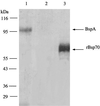Development of a gene inactivation system for Bacteroides forsythus: construction and characterization of a BspA mutant
- PMID: 11402017
- PMCID: PMC98550
- DOI: 10.1128/IAI.69.7.4686-4690.2001
Development of a gene inactivation system for Bacteroides forsythus: construction and characterization of a BspA mutant
Abstract
Bacteroides forsythus is a gram-negative anaerobic bacterium associated with periodontitis. The bspA gene encoding a cell surface associated leucine-rich repeat protein (BspA) involved in adhesion to fibronectin and fibrinogen was recently cloned from this bacterium in our laboratory. We now describe the construction of a BspA-defective mutant of B. forsythus. This is the first report describing the generation of a specific gene knockout mutant of B. forsythus, and this procedure should be useful in establishing the identity of virulence-associated factors in these organisms.
Figures




References
-
- Ausubel F A, Brent R, Kingston R E, Moore D D, Seidman J G, Smith J A, Struhl K, editors. Current protocols in molecular biology. New York, N.Y: John Wiley & Sons, Inc.; 1996.
Publication types
MeSH terms
Substances
Grants and funding
LinkOut - more resources
Full Text Sources

